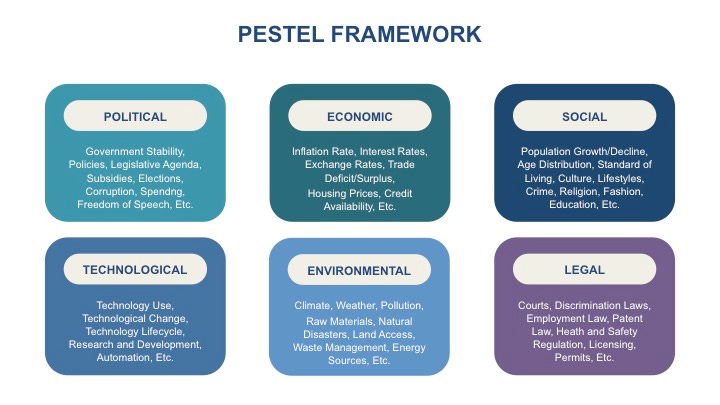The PESTEL Framework
Your system, be it a company, government agency, community, technology or product, exists within a broader environment that exerts influence on your interests. So when studying the future of your system, you also need to examine the world in which it will live. One tool for doing this is the PESTEL (Political, Economic, Social, Technological, Environmental and Legal) framework.
The PESTEL framework is really just an outline to facilitate thought and organization. I believe it originally started as PEST, but over time someone added environmental and legal to make it PESTEL. People have since added extra areas to include ethics, demographics, intercultural, military, infrastructure and physical resulting in variations with acronyms such as STEEPLE, SPELIT and PMESII-PT. I use PESTEL, but feel free to structure it however works best for you.
When assessing the future, I typically start with the system of interest and identify all the things that might drive or influence it going forward. This includes examining what might remain constant, what could change, new developments and “what if” scenarios. I then set the system aside and just explore what the future environment might look like. This offers a different perspective and quite often yields additional areas that can be rolled into the analysis.
Let’s look at an example for a small distillery. Other than the typical issues that would likely be uncovered through a team brainstorming session, what less obvious influences might come from the environment?
Political. What’s the likelihood of increased payroll, property or sales tax? Or a sin tax on alcoholic beverages? Mandatory minimum wage? How might changes in trade policy and agricultural subsidies impact grain supply and pricing? Can we expect a tax break or might they go to our larger competitors, but not us?
Economic. How much will lines of credit cost? Will we be able to get loans? Will customers have more or less disposable income? Could there be a shortage of raw materials? Does cash have a future?
Social. Will people stay home more or go out to bars, restaurants and clubs? Will rising crime draw people away from the inner city? Will there be a rise in religions that shun drinking? Will people identify more with tradition or an emerging pop culture? What’s the attitude regarding local verses nationally recognized or American verses foreign produced?
Technological. Will the established social media sites remain popular or be replaced by something else? Will trends in advertising and clickbait drive people away from social media? Can we find parts for aging equipment?
Environmental. Will reasonably priced renewable energy sources be available so that we can power our own operation? How might our waste management system change?
Legal. Will health and safety regulations become more stringent? Might courts hold us liable for irresponsible drinking and drunk driving? Will the minimum drinking age be lowered? Will marihuana be legalized and become an alternative to alcohol?
You’ll see that some issues fit into more than one area and we could argue if a tax is political, economic or legal. But that’s missing the point. The idea is to get you thinking, to generate ideas and explore the possibilities. Give it a try. I think you’ll find it useful.

